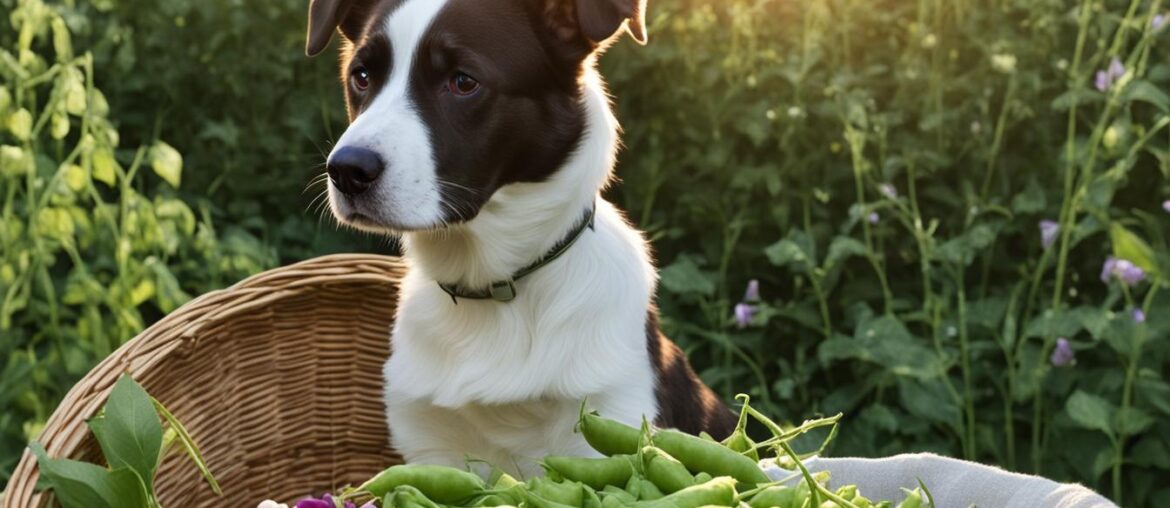When it comes to feeding our furry friends, we want to be sure we are providing them with safe and nutritious options. If you’re wondering whether sweet peas are a suitable addition to your dog’s diet, you’ve come to the right place. In this article, I will delve into the topic of sweet peas and their safety for canine consumption. We’ll explore the benefits, potential drawbacks, and the best ways to serve peas to dogs. So, let’s get started!
Key Takeaways:
- Sweet peas are considered poisonous to dogs and should be avoided at all costs.
- Green peas, such as snow peas, sugar snap peas, and garden or English peas, are safe for dogs to eat as an occasional treat.
- Peas are a good source of vitamins, minerals, protein, and fiber, providing various nutritional benefits to dogs.
- Dogs with kidney problems should avoid peas due to their purine content, which can lead to kidney stones.
- It is important to monitor for any adverse reactions and consult with a veterinarian regarding dietary needs or restrictions for individual dogs.
Can Dogs Eat Sweet Peas: Nutritional Benefits and Drawbacks
Peas provide various nutritional benefits to dogs. They are rich in vitamins, including A, K, and B vitamins. They also contain minerals such as iron, zinc, potassium, and magnesium. Peas are a good source of protein and high in fiber. They also contain lutein, an antioxidant that promotes skin, heart, and eye health.
However, it is important to note that peas may have drawbacks for some dogs. Dogs with kidney problems should avoid peas due to their purine content, which can lead to kidney stones.
Introducing peas into a dog’s diet should be done with caution, and owners should monitor for any adverse reactions or allergies. It is always best to consult with a veterinarian before making any changes to a dog’s diet.
Benefits of Peas for Dogs
- Rich in vitamins and minerals, including A, K, and B vitamins, iron, zinc, potassium, and magnesium
- Good source of protein
- High in fiber
- Contain lutein, an antioxidant that promotes skin, heart, and eye health
Drawbacks of Peas for Dogs with Kidney Problems
Dogs with kidney problems should avoid peas due to their purine content, which can lead to kidney stones.
It is important to always prioritize a dog’s specific dietary needs and consult with a veterinarian for personalized advice and guidance.
| Nutrient | Amount in Peas |
|---|---|
| Vitamin A | 95 IU (International Units) per 100g |
| Vitamin K | 24.8 mcg (micrograms) per 100g |
| Vitamin B1 (Thiamin) | 0.27 mg (milligrams) per 100g |
| Iron | 1.47 mg per 100g |
| Zinc | 1.24 mg per 100g |
| Potassium | 244 mg per 100g |
| Magnesium | 24 mg per 100g |
| Protein | 5.42 g per 100g |
| Fiber | 3.9 g per 100g |
Can Dogs Eat Sweet Pea Pods?
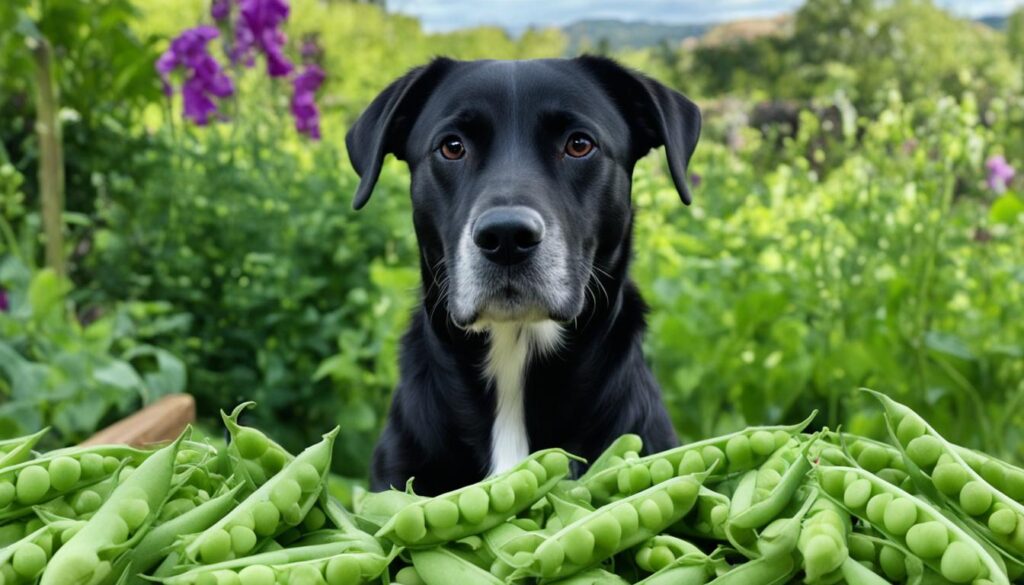
When it comes to including sweet pea pods in your dog’s diet, it’s important to take certain precautions. While dogs can eat sweet pea pods that are safe for humans to consume, it’s crucial to remove the peas inside the pod before feeding them to your furry friend. This is because the fibrous pods can be difficult for dogs to digest and may pose a choking hazard.
In the case of garden peas, which also have edible pods, it’s advisable to shell them before offering them to your dog. This will help eliminate any potential risks associated with the fibrous nature of the pods, ensuring a safe dining experience for your canine companion.
As with introducing any new food to your dog’s diet, it’s essential to monitor for any adverse reactions. Pay attention to your dog’s gastrointestinal health and overall well-being after consuming sweet pea pods or any other human food.
If you’re uncertain about feeding sweet pea pods to your dog or need further guidance on canine nutrition, consult with your veterinarian for professional advice tailored to your pet’s specific needs.
Ensure your dog’s dietary decisions are based on their overall health, age, breed, and any pre-existing medical conditions. While sweet pea pods can be a healthy addition to some dogs’ diets, it’s crucial to make informed choices to keep your pet safe and healthy.
Sweet Pea Pod Choking Hazard
Including sweet pea pods in your dog’s diet poses a potential choking hazard due to the fibrous nature of the pods. Dogs may have difficulty digesting these pods, and they can become lodged in their throats, leading to choking or other complications. To avoid any accidents, always remove the peas from the pods before feeding them to your dog.
| Can Dogs Eat Sweet Pea Pods? | Safe or Not? |
|---|---|
| Sweet Pea Pods | Safe for dogs as long as they are safe for humans to consume |
| Garden Pea Pods | Remove the pods before feeding them to your dog to avoid potential choking hazards |
Can Dogs Eat Canned Peas?

When it comes to feeding peas to your furry friend, it’s best to steer clear of the canned variety. Canned peas are typically packed with added sodium, which can be harmful to both dogs and humans. The excessive sodium content in canned peas can lead to dehydration and contribute to various health issues in dogs.
Dogs require a balanced diet that includes fresh, nutritious foods. While peas can provide a range of benefits, such as vitamins, minerals, protein, and fiber, it’s important to opt for fresh, frozen, or thawed peas instead of canned peas. By choosing fresh or frozen peas, you can ensure that your dog receives all the nutritional benefits without exposing them to excessive sodium.
Feeding vegetables to dogs can be beneficial for their overall health and well-being. However, it’s crucial to select the right vegetables and prepare them appropriately to meet your dog’s nutritional needs. By choosing dog-friendly vegetables like peas and avoiding canned varieties, you can provide your canine companion with a wholesome and balanced diet.
| Benefits of Fresh Peas for Dogs | Canned Peas |
|---|---|
| – Provide vitamins (A, K, B vitamins) | – High in sodium content |
| – Supply minerals (iron, zinc, potassium, magnesium) | – May contribute to dehydration |
| – Offer protein and fiber | – May pose health risks |
By avoiding canned peas and opting for fresh or frozen peas, you can ensure that your canine companion enjoys the nutritional benefits of this dog-friendly vegetable without any potential health risks. Remember to consult with your veterinarian to determine the appropriate serving size and frequency of pea consumption based on your dog’s individual needs.
Potential Risks of Feeding Peas to Dogs with Kidney Problems

Dogs with kidney problems should exercise caution when it comes to consuming peas. While peas are generally safe for dogs, they contain purines, which can be problematic for dogs with kidney issues. Purines are naturally occurring compounds found in certain foods and drinks, and when metabolized, they produce uric acid, which is filtered through the kidneys.
When dogs with kidney problems consume peas, the high levels of purines in these legumes can contribute to the accumulation of uric acid, leading to the formation of kidney stones and other kidney-related conditions. To prevent potential complications, it is crucial for dogs with kidney problems to follow a specialized diet prescribed by a veterinarian.
Remember, each dog is unique, and their dietary needs may vary based on their specific health conditions. Consulting with a veterinarian is essential in determining the most suitable diet for dogs with kidney problems. Veterinarians can provide tailored guidance to ensure optimal nutrition while minimizing potential risks to your four-legged companion’s health.
Peas in Commercial Dog Food and their Link to Heart Disease
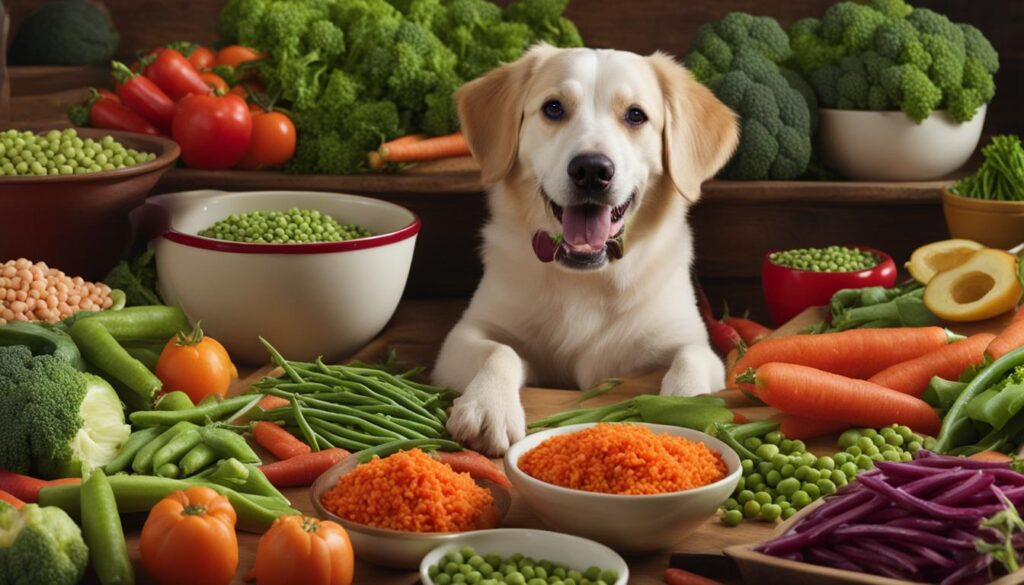
Peas are frequently included as an ingredient in commercial dog food due to their nutritional benefits. However, ongoing research suggests that peas and other legumes may be linked to heart disease in dogs. It is important to consult with a veterinarian to determine the best diet for your dog and consider any potential risks associated with the ingredients in their food.
While peas are generally safe for dogs to consume, the concern arises from the use of peas as a main ingredient in grain-free dog food formulas. Some studies have identified a potential correlation between a diet high in legumes and the development of dilated cardiomyopathy (DCM) in certain breeds. DCM is a serious heart condition that can lead to heart failure.
It is important to note that the exact cause of this potential link is still under investigation, and the majority of dogs who consume foods containing peas or other legumes do not develop heart disease. However, if you have a dog that is at an increased risk for DCM, such as a breed prone to the condition or a dog with a family history, it may be wise to avoid dog food formulas that list peas as a primary ingredient.
When choosing a commercial dog food, consider looking for formulas that have a balance of quality animal protein sources, whole grains (if appropriate for your dog), and a variety of vegetables that are safe for dogs, such as carrots, green beans, and sweet potatoes. This can help ensure that your dog receives a well-rounded and nutritious diet.
The Role of Taurine
Taurine is an amino acid that plays a crucial role in heart health. Some experts theorize that legumes, including peas, may interfere with taurine absorption in dogs, contributing to the potential development of heart disease. However, this hypothesis is still being investigated, and more research is needed to fully understand the relationship between legume-rich diets and DCM.
If you have concerns about your dog’s heart health or diet, it is essential to consult with a veterinarian. They can evaluate your dog’s specific needs and recommend an appropriate diet and supplementation, if necessary.
Best Ways to Serve Peas to Dogs
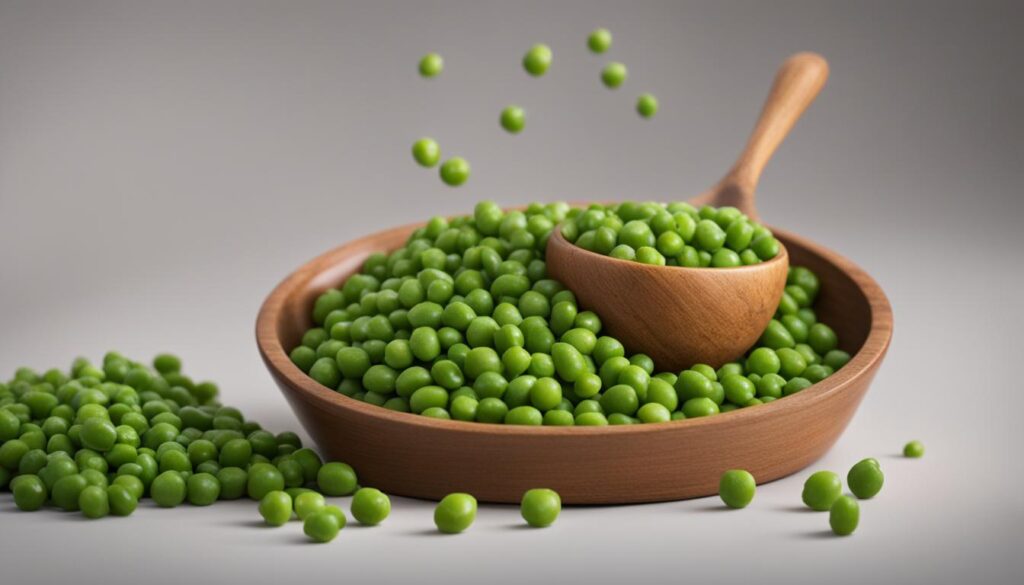
When it comes to serving peas to your dog, there are several options to consider. The key is to ensure that the peas are prepared in a way that is safe and beneficial for your furry friend.
1. Fresh Peas as Treats
Fresh peas can be an excellent choice for a dog-friendly snack. You can offer them to your dog one-by-one as treats, which can be a fun and rewarding experience. Just make sure to remove the peas from the pods before feeding them to your dog, as the pods can be difficult for dogs to digest and may pose a choking hazard.
2. Adding Peas to Regular Food
If you want to incorporate peas into your dog’s regular meals, you can simply mix them in with their food. This can be a great way to add some nutritional value to their diet and provide them with extra vitamins, minerals, protein, and fiber. Cooked peas are generally safe for dogs, but make sure to avoid using any seasonings or additives that may be harmful to them.
3. Blended Peas as a Supplement
Another option is to blend a small dollop of peas and add it as a supplement to your dog’s meal. This can be particularly beneficial for dogs who may have difficulty chewing or digesting whole peas. Blending the peas can help release the nutrients and make them easier for your dog to consume.
4. Thawed Frozen Peas
If you prefer to use frozen peas, it’s important to thaw them completely before serving them to your dog. This will help prevent any choking hazards and ensure that they are easier for your dog to eat and digest. Frozen peas can be a convenient option, especially when fresh peas are not readily available.
Remember, the serving size of peas should be appropriate for your dog’s size and dietary needs. It’s always best to consult with your veterinarian to determine the right amount of peas to feed your dog and to address any specific concerns or dietary restrictions they may have.
| Ways to Serve Peas to Dogs | Benefits |
|---|---|
| Fresh Peas as Treats | Fun and rewarding snack option. |
| Adding Peas to Regular Food | Extra vitamins, minerals, protein, and fiber in your dog’s diet. |
| Blended Peas as a Supplement | Easier consumption and digestion for dogs with chewing difficulties. |
| Thawed Frozen Peas | Convenient option when fresh peas are not available. |
Are Sweet Peas Poisonous to Dogs?
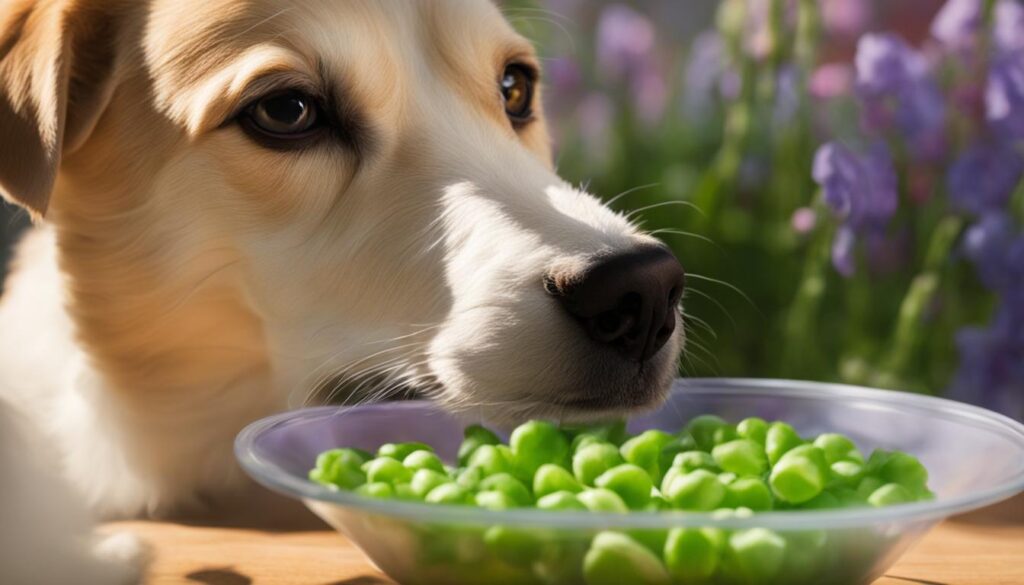
Sweet peas, which are non-edible flowering plants, should be avoided as they are considered poisonous to dogs. They contain a toxin called aminopropionitrile, which can cause weakness, lethargy, seizures, and even death in dogs. Even a small amount of sweet pea can be dangerous for dogs. If you suspect your dog has ingested sweet peas or any other poison, immediate veterinary assistance should be sought.
Signs of Sweet Pea Poisoning in Dogs
- Weakness and lethargy
- Inability to coordinate movements
- Tremors or seizures
- Vomiting and diarrhea
- Loss of appetite
If you notice any of these symptoms in your dog, it is crucial to seek veterinary care right away.
While sweet peas may be visually appealing, they can pose a significant danger to our furry friends. Remember to keep sweet peas out of reach of your dog, especially in outdoor areas where they may encounter wild sweet pea plants.
Symptoms and Treatment of Sweet Pea Poisoning in Dogs
Ingesting sweet peas can be toxic to dogs, causing a range of symptoms and potentially life-threatening complications. If you suspect your dog has ingested sweet peas and is showing any signs of poisoning, it is crucial to seek immediate veterinary attention. Early recognition and prompt treatment are vital to safeguard your dog’s health and well-being.
Sweet pea poisoning can manifest in various symptoms, including:
- Stomach pain
- Loss of appetite
- Diarrhea and vomiting
- Weakness and lethargy
- Tremors
- Seizures
- Respiratory distress
If your dog exhibits any of these symptoms after ingesting sweet peas, do not delay in contacting your veterinarian. They will be able to assess your dog’s condition and provide appropriate treatment based on the severity of the poisoning.
The treatment for sweet pea poisoning in dogs will depend on factors such as the type and amount of sweet peas ingested and the severity of symptoms. The veterinarian may employ various interventions, including:
- Inducing vomiting to remove any remaining peas from the stomach
- Administering activated charcoal to absorb any remaining toxins
- Providing intravenous fluids to combat dehydration and promote kidney function
- Monitoring and controlling seizures, if present
- Supportive care to alleviate symptoms and aid recovery
It is important to note that the prognosis for sweet pea poisoning in dogs varies and depends on the individual case. Dogs who receive immediate veterinary care have a higher chance of recovery. Therefore, if you suspect your dog has ingested sweet peas or any other potentially toxic substance, do not hesitate to contact your veterinarian for guidance and assistance.
If you see these symptoms of sweet pea poisoning in your dog, seek immediate veterinary attention.
Wrapping Up
In conclusion, while sweet peas should be avoided due to their poisonous nature for dogs, green peas like snow peas, sugar snap peas, and garden or English peas can be included in a dog’s diet as a safe and nutritious treat. These dog-friendly vegetables offer a range of vitamins, minerals, protein, and fiber, contributing to a well-rounded canine nutrition.
However, it’s essential to remain vigilant and monitor for any adverse reactions when introducing peas or any other new food to your dog’s diet. Every dog is unique, and it’s crucial to consult with a veterinarian to ensure that the specific dietary needs and restrictions of your dog are met.
Remember, maintaining a balanced diet and providing safe human foods for dogs, such as vegetables like peas, can be beneficial for their overall health and well-being. By prioritizing your dog’s nutrition and making informed choices about the vegetables they can eat, you can contribute to their long and happy life.
FAQ
Are sweet peas safe for dogs to eat?
Yes, sweet peas are safe for dogs to eat. However, caution should be taken with any new food, and watching for any adverse reactions is important.
What are the nutritional benefits and drawbacks of feeding sweet peas to dogs?
Sweet peas provide various nutritional benefits to dogs. They are rich in vitamins (A, K, B vitamins), minerals (iron, zinc, potassium, magnesium), protein, and fiber. However, sweet peas may have drawbacks for dogs with kidney problems due to their purine content.
Can dogs eat sweet pea pods?
Dogs can eat sweet pea pods as long as they are safe for humans to eat. However, it is important to remove the peas inside the pod to prevent choking hazards.
Can dogs eat canned peas?
It is not recommended to feed dogs canned peas due to the high sodium content, which can be harmful to dogs.
What are the potential risks of feeding peas to dogs with kidney problems?
Peas should be avoided by dogs with kidney problems due to their purine content, which can lead to kidney stones and other kidney conditions.
Is there a link between peas in commercial dog food and heart disease in dogs?
Some ongoing research suggests that peas and other legumes in commercial dog food may contribute to heart disease in dogs. It is important to consult with a veterinarian about the best diet for your dog and consider any potential risks associated with the ingredients in their food.
What is the best way to serve peas to dogs?
Peas can be served to dogs in various ways. They can be given as fresh peas one-by-one as treats or added to a dog’s regular food to add nutritional value. Cooked peas can be mixed into a dog’s meal, or a small dollop of blended peas can be added as a supplement. It is important to monitor serving size and watch for any adverse reactions or allergies.
Are sweet peas poisonous to dogs?
Yes, sweet peas are considered poisonous to dogs. They contain a toxin called aminopropionitrile, which can cause various symptoms and even death in dogs. Immediate veterinary assistance should be sought if sweet pea poisoning is suspected.
What are the symptoms and treatment of sweet pea poisoning in dogs?
Symptoms of sweet pea poisoning in dogs may include stomach pain, loss of appetite, diarrhea/vomiting, weakness, lethargy, tremors, seizures, and even death. Treatment will vary depending on the severity of symptoms, and it is important to contact a veterinarian immediately for diagnosis and appropriate care.
Can dogs eat other types of peas?
Yes, dogs can safely eat other types of peas, such as green peas like snow peas, sugar snap peas, and garden or English peas. These peas provide nutritional benefits and can be given as an occasional treat or incorporated into a dog’s regular diet. However, caution should be taken with any new food, and watching for any adverse reactions is important.


